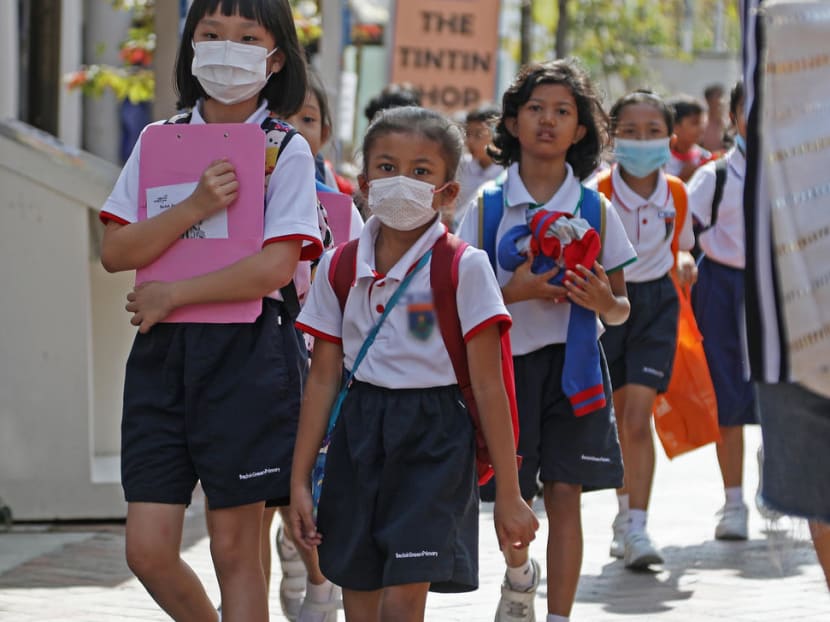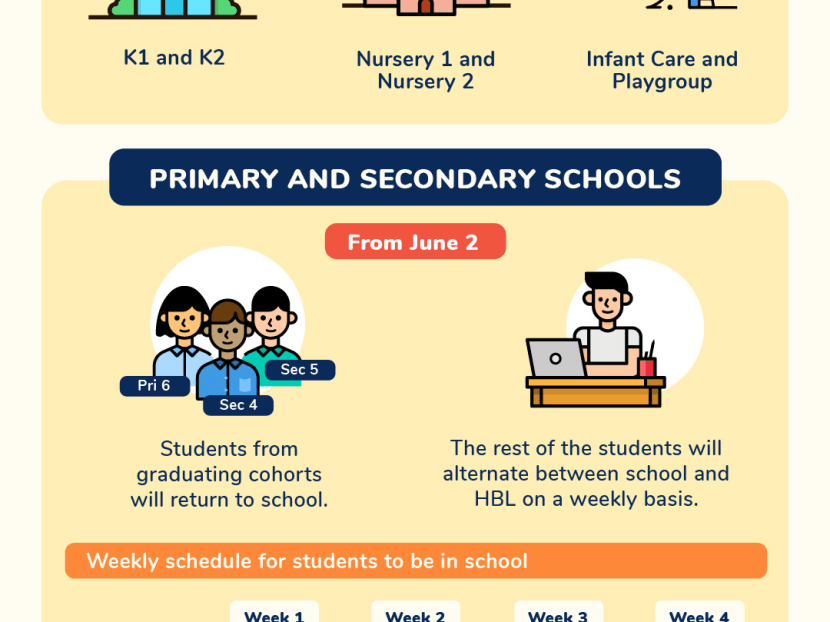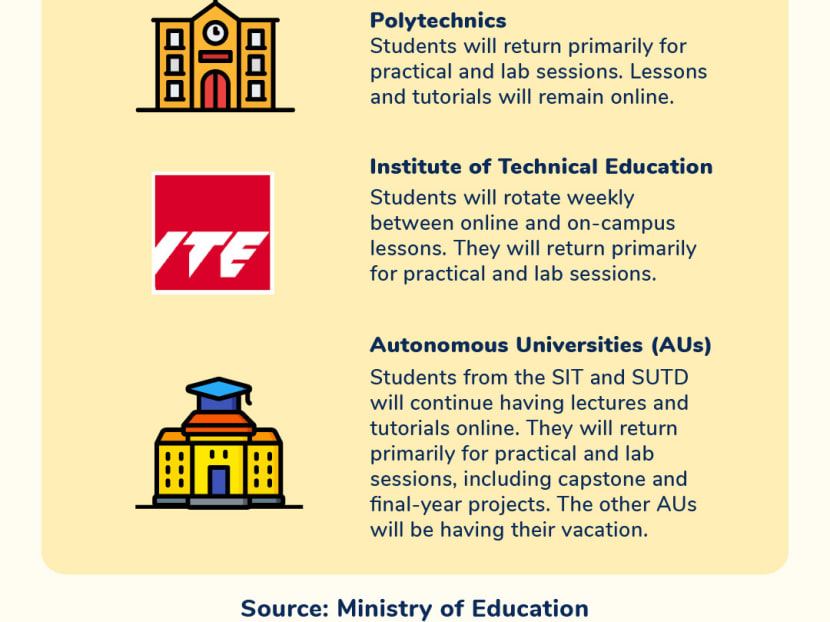Covid-19: Schools to reopen in stages from June 2; graduating students first to be back in the classroom full-time
SINGAPORE — Schools will reopen on June 2 as the Government eases the circuit breaker measures, but only students from graduating primary and secondary school cohorts will attend full-time initially, the Ministry of Education (MOE) announced on Tuesday (May 19).

All students will return to school as per normal only when a broader easing of the Covid-19 measures at the national level occurs.
SINGAPORE — Schools will reopen on June 2 as the Government eases the circuit breaker measures, but only students from graduating primary and secondary school cohorts will attend full-time initially, the Ministry of Education (MOE) announced on Tuesday (May 19).
Students from other cohorts — Primary 1 to 5 and Secondary 1 to 3 — will rotate weekly between home-based learning and returning to school for lessons, so as to reduce the number of students at school at any one time for “better physical distancing”, it said.
For junior college and Millennia Institute students, a rotation system will mean only 50 per cent of them to be back at school at any one time to ensure that all students have “more than adequate face-to face time with their teachers, particularly the graduating cohorts”, said MOE.
All students will return to school as per normal only when a broader easing of the Covid-19 measures at the national level occurs, it added, noting that the initial arrangements might take a few weeks. The date for such a broader easing has not yet been set.
Meanwhile, self-help group enrichment activities, as well as private tuition and enrichment, are to remain suspended until further notice, it said.
Only MOE centre-based lessons are to resume for graduating cohorts from June 2, with additional safe management measures in place, it stated. This includes Secondary 3 Higher Mother Tongue Language students taking the O-Level Mother Tongue Language paper.
As for preschoolers, only Kindergarten 1 and 2 children are to return on June 2. Nursery 1 and 2 children are to return from June 8, while infant care and playgroup children may return from June 10, said the Early Childhood Development Agency (ECDA).
Institutes of higher learning — including polytechnics, institutes of technical education and autonomous universities — will continue to have lectures and tutorials online, barring the time when they have to return for practice and lab sessions.
The gradual school reopening measures were announced at a media conference on Tuesday held by the multi-ministry task force handling the Covid-19 response, when it outlined the broader plans for the easing of certain circuit breaker measures, including those relating to education.

Education Minister Ong Ye Kung said the arrangements are being rolled out in phases as schools “cannot open with a big bang”.
On giving priority to graduating students, he said: "I know we have been trying to dial down the over-emphasis on examinations, but I know these students and their parents are getting a lot more anxious.
"We want these students to come back on a daily basis to support them, because national examinations are coming."
The staggered arrangements are also aimed at helping students who need additional support, such as students from Assumption Pathway School, NorthLight School and special education schools. The return of these students will be staggered from June 2, with all of them to be back in school by June 8.
MOE stressed that students and staff who are unwell, or have adult household members on home quarantine or stay-home notices, or have flu-like symptoms such as fever or cough, are required to stay away from school.
“MOE will continue to monitor the Covid-19 situation closely and provide the necessary support to our schools, educators and students, as they gradually resume lessons,” MOE said.
“We will also respond accordingly in the weeks and months ahead and announce further updates if required, as the national posture evolves.”

WHAT STUDENTS CAN EXPECT WHEN THEY RETURN
School won’t be the same when students return.
Besides still having to wear a mask or face shield throughout the school day — including when taking national exams — and do temperature taking, they are to practise a wipe down of tables and shared equipment after use, and practise frequent hand-washing, said MOE.
These measures are part of the safe management measures by schools to keep returning students safe, it said.
In classrooms, students will also be seated further apart by adopting a seating arrangement normally used when they take their exams.
During recess time — which will be staggered among classes — students are to adhere to spaced seating rules at the canteen and other venues in school.
Students can also expect to arrive and be dismissed at different times to reduce congestion, MOE said.
Nevertheless, physical education (PE) lessons will resume “to ensure that students remain active and keep healthy”, MOE said, albeit with strict adherence to safe management measures.
Students and PE teachers will not be required to wear masks when engaging in strenuous physical activities such as running and workouts, MOE said.
This year’s National Physical Fitness Award (NAPFA) tests will be cancelled, given that students may not be sufficiently prepared physically, the ministry added.
The National School Games for the year are also cancelled as there is insufficient time to complete the season within the school calendar.
Mass physical gatherings continue to be suspended so co-curricular activities (CCA) will not be allowed to be held as they usually are. MOE said schools may explore the following options:
-
eCCAs: Conducted by coaches, instructors, or CCA teachers using digital means
-
Class-based student development programmes: Conducted face-to-face on an elective basis during or after curriculum hours, either by existing CCA instructors or vendors that schools can tap on from a list curated by MOE. Students are to remain in their class groupings for such programmes
FOR THOSE TAKING EXAMS
Some students are taking examinations for GCE A-Level H3 subjects on May 28, and GCE O- and A-Level mid-year mother tongue languages on June 18 or 19.
Those who have to be absent from school due to them being on home quarantine order, stay-home notice or leave of absence will not be allowed to sit for the examinations, however.
They will take the year-end examinations instead, MOE said.
As for H3 subjects — more advanced classes — taught by autonomous universities with no year-end examinations, MOE said the Singapore Examinations and Assessment Board (SEAB) will “apply an established procedure” to derive a subject grade in assessing them.
APPROACH FOR PRESCHOOLS, EARLY INTERVENTION CENTRES
Minister for Social and Family Development Desmond Lee said on Tuesday the reopening of preschools and early intervention centres will take place in phases from June 2 to support parents as they return to work.
In a press release, ECDA said that the reopening of early intervention centres providing the Early Intervention Programme for Infants and Children and centres on the Pilot for Private Intervention Providers scheme will start with in-person intervention for children with greater needs, or who are attending only early intervention centres.
To minimise the risk of transmission across centres and institutes, supplementary programmes such as enrichment and early intervention services where providers may move across different centres remain suspended, it said.
As part of stepped-up monitoring, all preschool and early intervention staff are undergoing a one-time swab test, it added. The tests started on May 15 and are scheduled to be completed by the end of May.
“During this proactive testing of all staff, we expect some positive cases to be identified,” ECDA said. “In such cases, we will work with affected preschools and early intervention centres to adjust their staffing or reopen later when it is safe to do so.”
WHAT PRESCHOOLERS AND STAFF CAN EXPECT
All children aged two and above are to wear a mask or a face shield when in school.
The first two weeks of the preschools’ reopening will be dedicated to strengthening the children’s public health awareness and building a culture of Covid-safe habits among staff, children and their parents, ECDA said.
Safe management measures at preschools are referred to as “Covid-safe ABCs”.
A - ACCESS
-
Restricting entry of visitors
-
Restricting staff and children who face a higher risk of infection, such as children with household members on home quarantine orders or stay-home notices
-
Requiring everyone to log their entry using the web link SafeEntry and to make travel declarations
-
Doing strict temperature and other health checks for all staff and children multiple times a day
B - BEHAVIOUR
-
All staff and children (those two years and older) are to wear a mask or face shield
-
Handwashing and other aspects of personal hygiene are to be stepped up
-
The cleaning and disinfection of premises and equipment, especially high-touch points and items, are also to be stepped up
-
Activities in each class are to be done in smaller groups, with no mixing between the groups
-
Students are to refrain from sharing materials as far as possible. Key equipment such as seats and cots is to be designated to particular children
C - CLASSROOMS
-
Keep staff and children within their own bays, floors or classes as far as possible
-
Stagger the times for drop-off and pick-up of children to reduce the interaction of people at arrival and dismissal
-
Stagger the use of common areas and facilities by different classes to avoid interaction between classes
-
Suspend cross-deployment of staff across centres.
-
Suspend cross-class activities for children and staff, such as large group activities, enrichment programmes and other activities such as staff meetings, training and other types of gatherings
While such measures are in place, ECDA urges parents to monitor the health of their children, seek medical attention promptly if the children feel unwell and not take them to the preschools or centres.
“These children should return only when fully recovered. We seek parents’ understanding if some of these measures cause inconvenience,” it said.
“They are necessary safety precautions during these exceptional times, and we thank everyone for their cooperation. Families can also help to reinforce good hygiene habits at home, such as the regular washing of hands with soap.”











